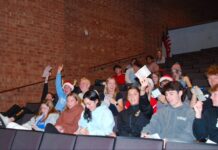
Nick Lenk, a newly hired science teacher at Chapel Hill High School, believes in improving K-12 student engagement through extracurricular involvement, particularly through after-school video game clubs.
He formed video game clubs at his two previous schools—Cass Technical High School in Detroit, Michigan, and East High School in Des Moines, Iowa—and his PhD dissertation focused on the effects of such clubs on student engagement.
As active club members, students felt more attached to their school, peers and teachers, Lenk said his research found. “They felt obligated to perform better because of those relationships. The same benefits that apply to other after-school clubs also apply to video game clubs.”
The Cass Tech club grew to over 100 students before Lenk left last year, according to the Detroit Free Press.
A video game club is not new to Chapel Hill High School. Last year, when the club advisor was Career and Technical Education teacher Garrison Reid, members held a 24-hour lock-in fundraiser in Hanes Theatre to support Extra Life, a program that donates to children’s hospitals.
Roughly 30 students attended the Chapel Hill club’s first gathering of this year on October 5, Lenk said. Members, who meet Fridays from 4 to 6 p.m., play games on their own consoles, connected to monitors that Lenk provides.
“It’s a social thing,” video game club president Neil Gardner, a sophomore, said. “You get to hang out with other people and do things together. It’s good to have at the school because you can meet people who have the same interests as you.”
This year, Lenk has taken over as video game club advisor. Now in his ninth year as an educator, he teaches four earth science periods and one physics period at Chapel Hill.
According to senior Erin Timmins, who has Lenk for earth science, Lenk’s teaching style is unlike other teachers’.
“He recognizes that students have other classes and does everything that he can to make his class interesting,” she said. “I feel like I can’t do him justice.”
In 2002, Lenk graduated from Poudre High School in Fort Collins, Colorado, and he became hooked on astronomy after taking a class at Front Range Community College. “The teacher was so good, and outer space is incredible,” he said. “I wanted to learn as much as I could about the cosmos.”
After two years, he transferred to the University of Colorado Boulder and received an undergraduate degree in astronomy. He earned a master’s degree in science education at Colorado State University, with a thesis on gamma rays impacting the atmosphere.
He earned his PhD in education leadership and policy from Wayne State University in Detroit. Committed to education, Lenk ruled out entering academia. “I never wanted to do just that—begging for money, your whole livelihood dependent on how much you make,” he said.
Lenk moved to Chapel Hill, where his wife took a job, this year.
“When I taught in Detroit, almost all of the students were black. Here, there’s a lot more diversity of culture,” he said. “My class sizes are a little smaller, though it’s similar mostly. The kids are just as nice.”
Senior Justin Hoben, in Lenk’s seventh-period physics class, said, “He’s good at lecturing. He doesn’t try to act as ‘official’ as other teachers. He’s much more relaxed, and he’s more approachable for questions.”
Senior Richard Gao, in earth science, also said Lenk is personally considerate, and a fair grader.
“He takes into account what every student needs. He’s chill,” Gao said. “Sometimes students are having a bad day, and Mr. Lenk will accommodate them.”











